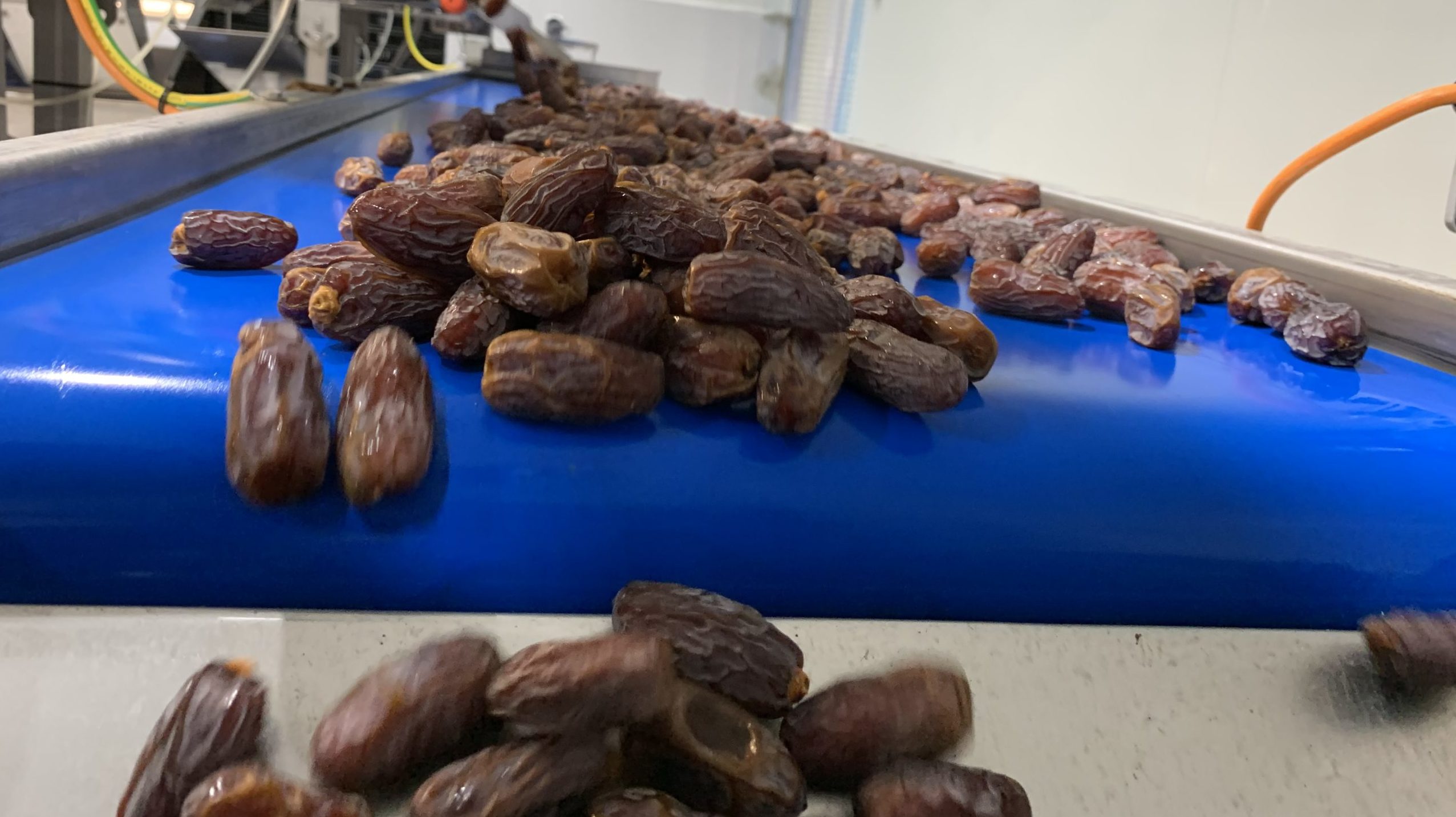Have a Date! Growing Business Boosts Desperate Palestinian Economy (VIDEO REPORT)
‘Every job created in Palestine gets us closer to an independent state,’ agricultural pioneer says
It is officially autumn. But on this early October day, the temperature in the Jordan Valley hovers close to 100° Fahrenheit (38° C) and farmers in Jiftlik, a rural village in the heart of the sun-baked valley, are hard at work as the harvest season has begun.
The sweet, plump Medjool dates are flourishing, not far from the Dead Sea.
This is where Dr. Abdel Malek Jaber, a Palestinian-Canadian, planted thousands of trees on more than 40 acres and started his date business, Hasad Palestine.
Armed with a technological education and a Ph.D. in economics, Jaber returned home at the onset of the Oslo peace process in 1993, to serve on Palestinian Technical Committees and help create strategic plans for the energy sector in Palestine.
He was CEO and vice chairman of the Ramallah-based Paltel Group telecommunications enterprise and headed several regional tech companies before switching professions and becoming a date farmer.
Jaber is the chairman of Hasad Palestine for Investment and Agriculture Marketing. It is one of the largest date farms in the Palestinian territories.
The idea for Hasad came from traveling, Jaber told The Media Line.
“I started getting interested in this business while traveling abroad and actually looking at the products on the shelves,” he expands. “I looked back at Palestine and saw what’s going on, who’s doing what, and I did my homework.”
Part of that homework was to check out the competition, “looking at the Israeli experience, because they are the market leaders when it comes to the Medjool dates. They have sophisticated business models, state-of-the-art packing houses, and when I looked at what’s going on, I realized what was missing [from Palestinian efforts] and what needed to be done.
I discovered that all the Israeli factories have replaced their Israeli-made machines with state-of-the-art Italian machines. Where do the old machines go? They enter the Palestinian market. I said this is not going to happen. I’m going to buy new machines
“What was missing was the high quality, the consistent quality. Because if you look at the Palestinian factories operating up until before having this new factory [Hasad’s new facility in Jiftlik], they are all second-hand, third-hand Israeli machines,” Jaber says.
He says he has upped his game and is able to compete.
He went out and purchased the best machinery available. Jaber built top-notch facilities; he spent millions of dollars on brand-new machinery, to solidify Hasad’s position as a major Palestinian date producer.
“I discovered that all the Israeli factories have replaced their Israeli-made machines with state-of-the-art Italian machines. Where do the old machines go? They enter the Palestinian market. I said this is not going to happen. I’m going to buy new machines,” Jaber continues.
The factory has state-of-the-art Italian-made machinery. The production capacity of this machine is 4 tons per hour, and it has the ability to determine the size of the date and the percentage of air in it. Last year, in the old factory, we had machines with a daily production capacity of no more than 7 tons per eight-hour shift
Hasad manager Nabil Abdel Razek told The Media Line that with the new equipment they will be able to improve both volume and quality.
“The factory has state-of-the-art Italian-made machinery. The production capacity of this machine is 4 tons per hour, and it has the ability to determine the size of the date and the percentage of air in it. Last year, in the old factory, we had machines with a daily production capacity of no more than 7 tons per eight-hour shift,” Abdel Razek says.
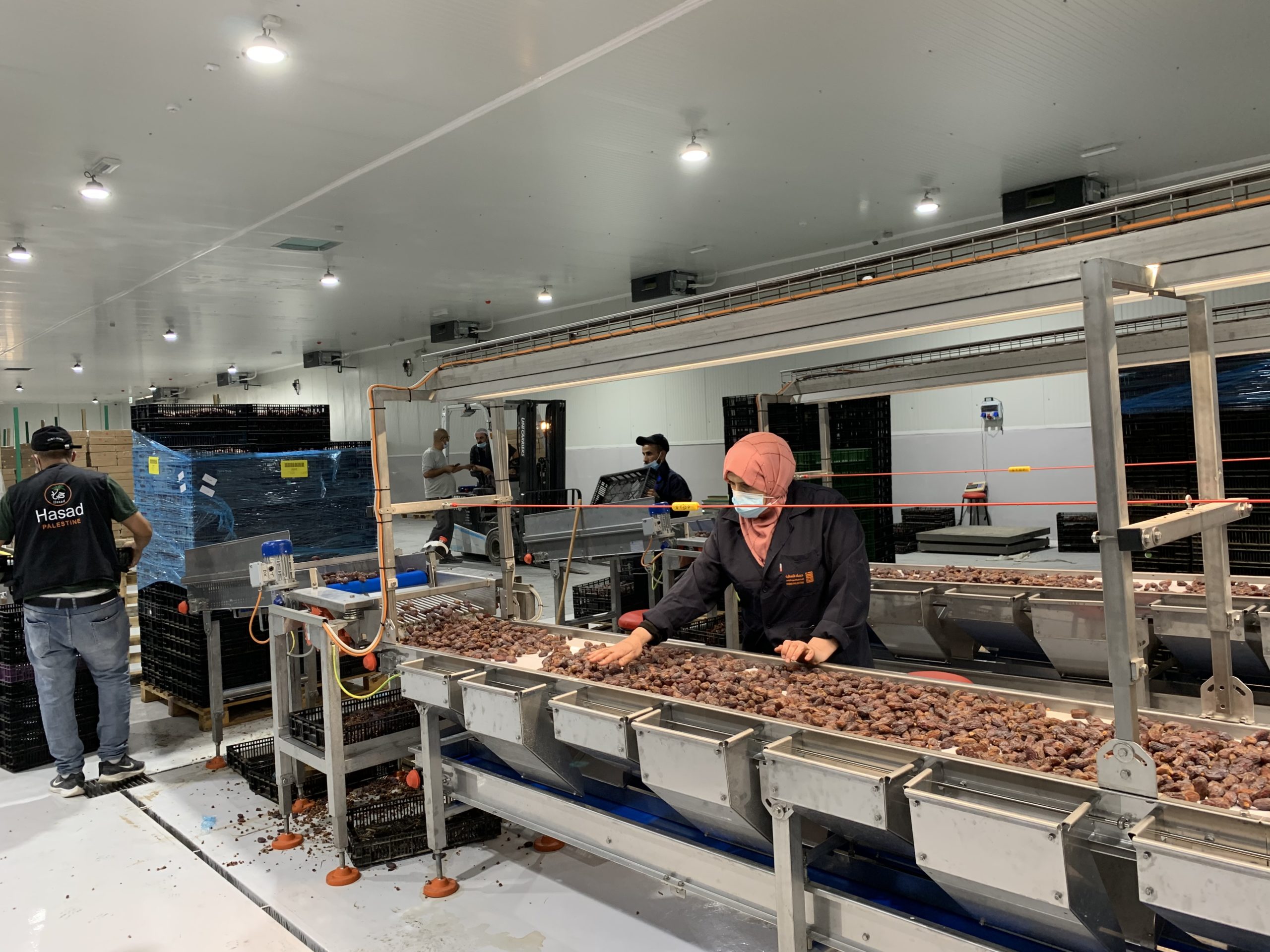
Hasad Palestine factory, Jiftlik, West Bank, September 23, 2020. (Mohammad Al-Kassim/The Media Line)
Operation manager Shady Daraghmeh told The Media Line that farmers are hard at work.
“In the first stage we harvest the dates at the farms, and then we perform a preliminary sorting.
During this stage, the damaged dates are discarded, and the fresh dates that need to go through a drying process are separated. Then they are sent to the factory.”
It’s definitely a big challenge to do any business in Area C, which is under the full control of the Israelis. The Israeli army, security, government, all Israeli authorities are in charge of zone C
Jaber’s farm and factory are in Area C of the West Bank. He says the decision to invest in Area C was not easy. He took a major risk but says it was worth it.
“It’s definitely a big challenge to do any business in Area C, which is under the full control of the Israelis. The Israeli army, security, government, all Israeli authorities are in charge of zone C,” he says, adding that the many restrictions the Israeli military imposes there make things expensive.
“The fact that we did it provides a living example proving that it’s not easy. It cost a lot of money because you have to hire a large team of lawyers and engineering firms that understand and know the difficult, zigzagging roads, to get the necessary permits. It’s very costly. It’s a lengthy process that requires a lot of patience,” Jaber says.
There are about a dozen major Palestinian date farms in the Jordan Valley, and they all have one thing in common: not enough water.
Hossam Badarneh, who oversees the orchards at Hasad, told The Media Line that water is scarce in this area and many wells are starting to dry up. He says his farm is one of the lucky ones as it has its own well, which dates back to when Jordan controlled the area.
“We have a well that produces 70 cubic meters of water an hour and brings up surface water. Because the Israelis do not allow us to dig deep, this leads to a high level of salinity. Our well has a salinity of 3,000 parts per million, and we face great difficulties from the Israeli occupation in allowing the maintenance of the well, and its expansion,” Badarneh says.
Hasad Palestine owns more than 2,500 date palms, manages 10,000 more, and employs some 100 people. During the harvest, the number of people working can double.
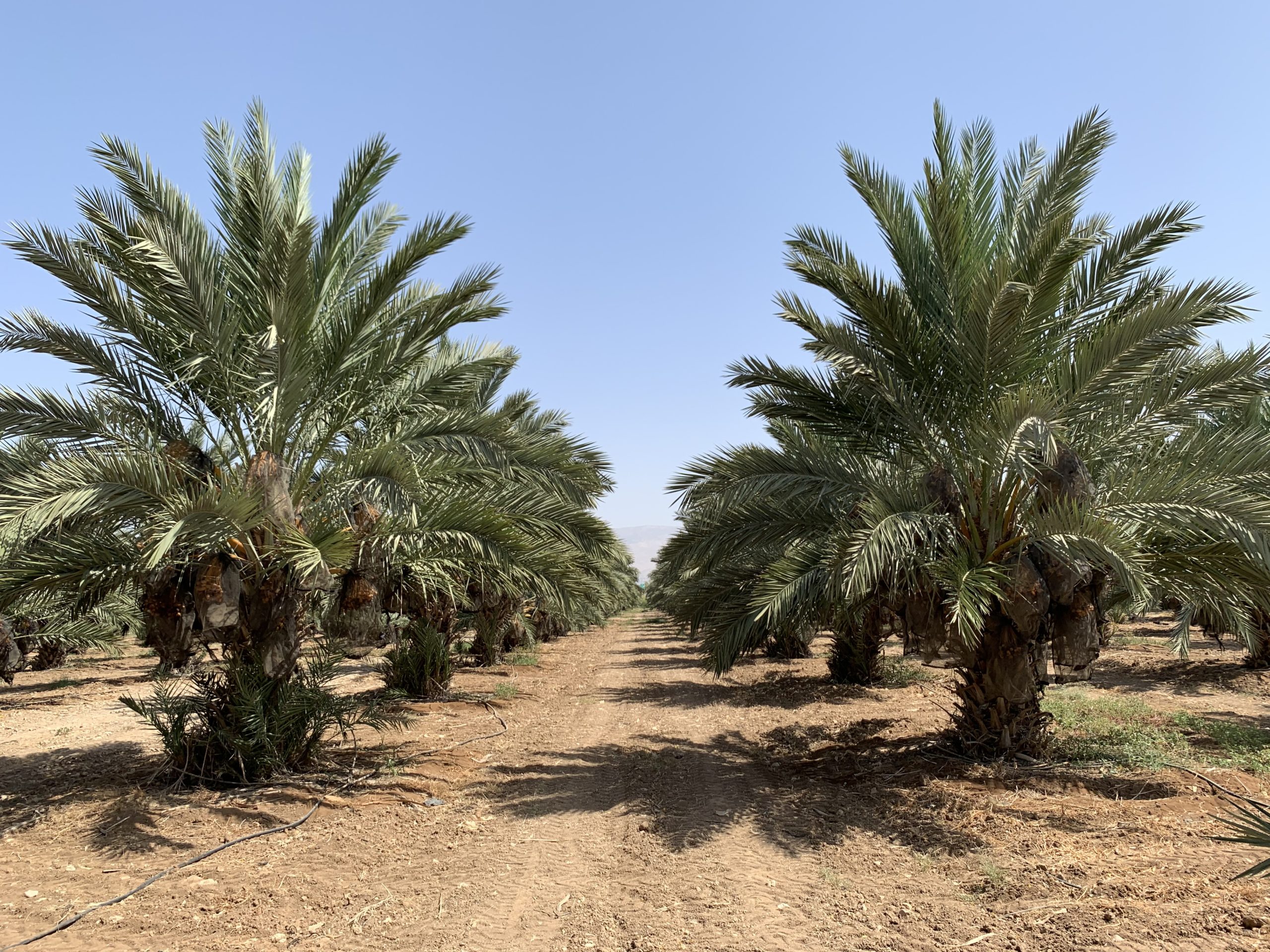
Date palms at the Hasad Palestine farm, Jiftlik, West Bank, September 23, 2020. (Mohammad Al-Kassim/The Media Line)
Jaber has plans to double the number of trees and triple date production in the coming years. This means injecting millions of dollars into his business.
Many of the failures in Area C came because Palestinians were dealing with the problems on their own, he says.
“This requires a bold, aggressive approach; it demands investment, but such investment in this part of Palestine is worth it. There are huge possibilities for investment in zone C for Palestinian business leaders,” Jaber says.
Agriculture has long formed a pillar of Palestinian society, bringing in much-needed income and creating a bond between man and land.
Jihad Abu Asal, governor of Jericho and the Jordan Valley, says Palestinians need more businesses in the valley to create jobs.
The existence of a company such as Hasad works to strengthen the steadfastness of farmers and our people on their land
“We lack such factories and we desperately need them. The existence of a company such as Hasad works to strengthen the steadfastness of farmers and our people on their land,” Abu Asal says.
Palestinian date farms are essential to asserting Palestinian control and ownership of the land in the Jordan Valley. But small farmers are talking seriously about abandoning the land altogether. And that is where Jaber says his sense of social responsibility kicked in.
“We offered farmers the option of using our new factory,” he says. “Usually we go out and buy the dates from the farmers. This year the prices are low, so we went to the farmers and told them that we can’t buy your dates, but we are offering you another option.
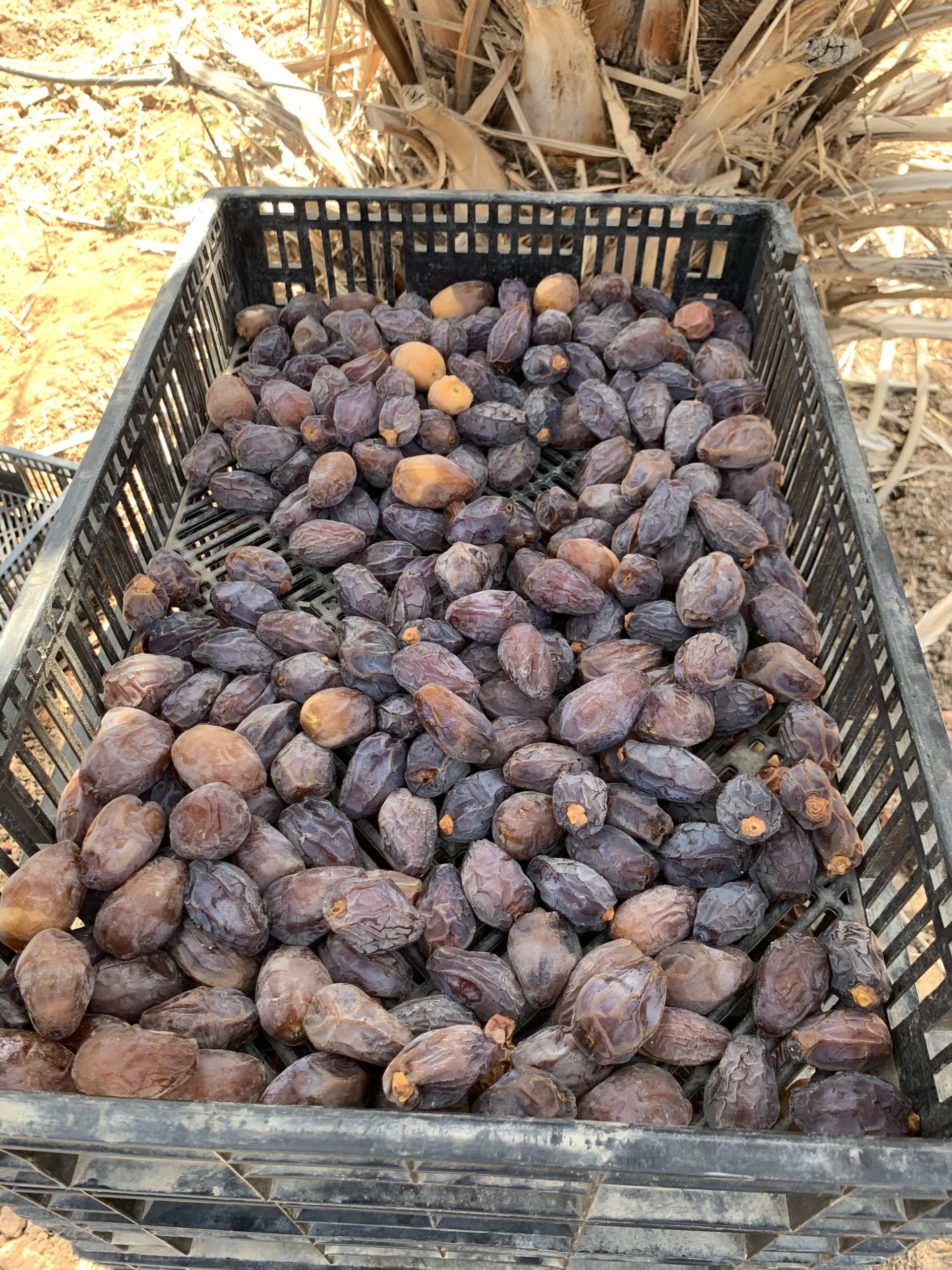
Harvested dates, Hasad Palestine farm, Jiftlik, West Bank, September 23, 2020. (Mohammad Al-Kassim/The Media Line)
“We will sell your dates for you against a commission, 6%, and we will guarantee a minimum price and we’ll give you a down payment,” Jaber says.
I believe every single job that you create in Palestine gets us closer to creating an independent Palestinian state. Having Palestinians stay in their land with solid footing, not feeling they have to beg for money or desperate to pay for their education or their health care or having to be smuggled into Israel [to work there]
West Bank date farming is one of the most important parts of Palestinian agriculture and has become a major part of the economy. The sector has grown manyfold in the last two decades.
One way he says things can improve is for Palestinians abroad to finance local farmers.
“What I’m saying is the strategy regarding zone C has to be smart and creative, and one way to do it is to have investors.”
He is keen on helping other Palestinian farmers and businesses succeed, by helping them conquer new markets. He is certain that financial security will lead to achieving Palestinian aspirations.
“I believe every single job that you create in Palestine gets us closer to creating an independent Palestinian state. Having Palestinians stay in their land with solid footing, not feeling they have to beg for money or desperate to pay for their education or their health care or having to be smuggled into Israel [to work there].”
Jaber’s farm and factory are surrounded by dozens of Israeli settlements, as the Israel military controls 90% of the Jordan Valley.
He does not work with Israeli farmers.
“We don’t have any relationship with any Israeli farmers or packing plants. … We are competitors. We learned from them. We consider the largest Israeli producers our competitors; we go after their markets, and we compete with them on quality and price,” Jaber says.
The Palestinian Medjool date industry is relatively new. “Most of our trees are younger than 8 years old, and nearly all of the farms are less than 20 years old,” Daraghmeh says.
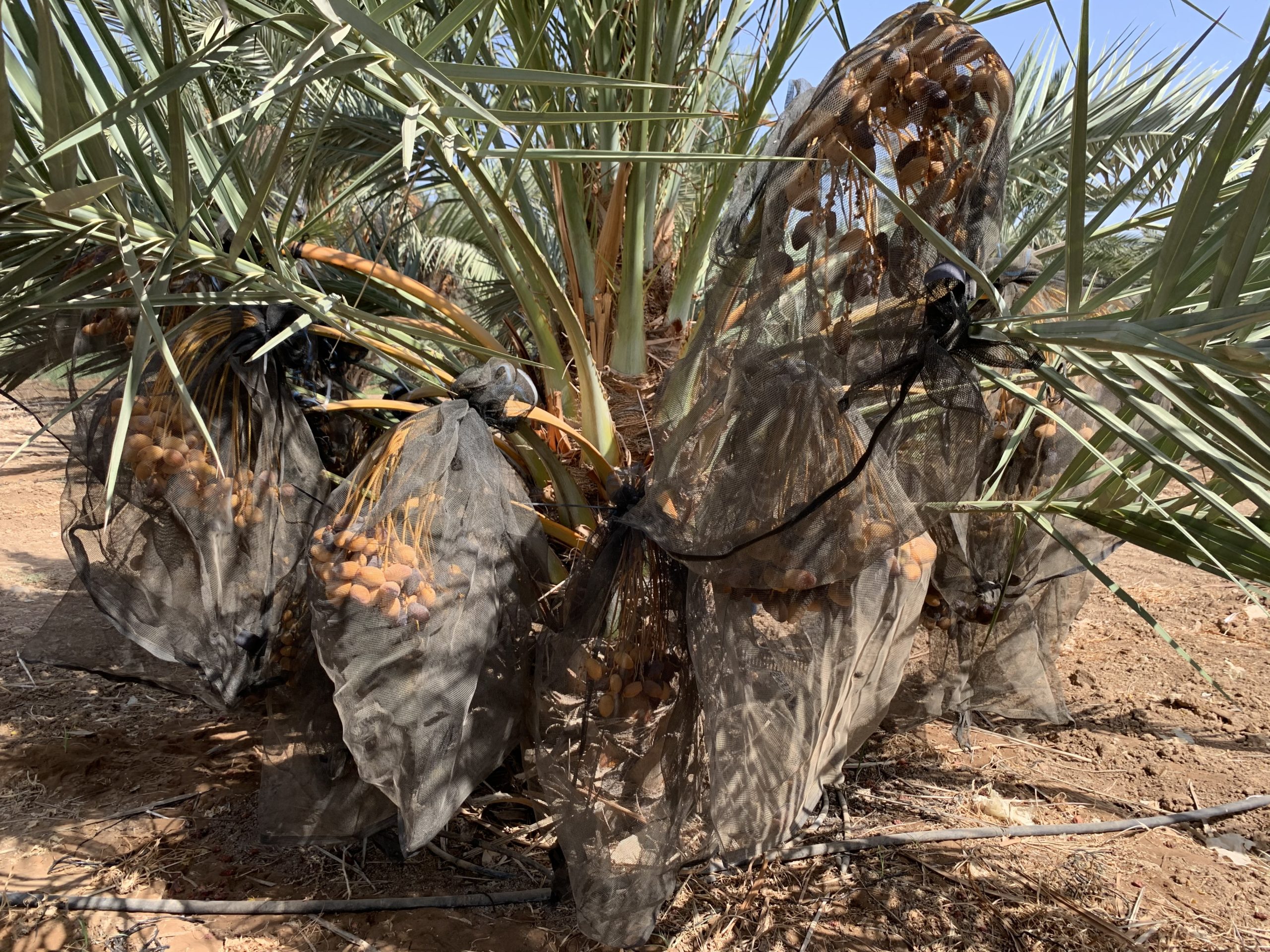
Palm tree with dates, Hasad Palestine farm, Jiftlik, West Bank, September 23, 2020. (Mohammad Al-Kassim/The Media Line)
Hasad this year is expected to increase its production this year from 40 tons to a whopping 90 tons. “This has a lot to do with our young trees and state-of-the-art factory,” Daraghmeh says.
Hasad’s biggest markets are the UK, Turkey, Malaysia and Indonesia. It has major distribution hubs in the Netherlands, serving Europe, and in Toronto, serving North America, Jaber says. He is optimistic about the future of his business and of other Palestinian date businesses in the Jordan Valley.

